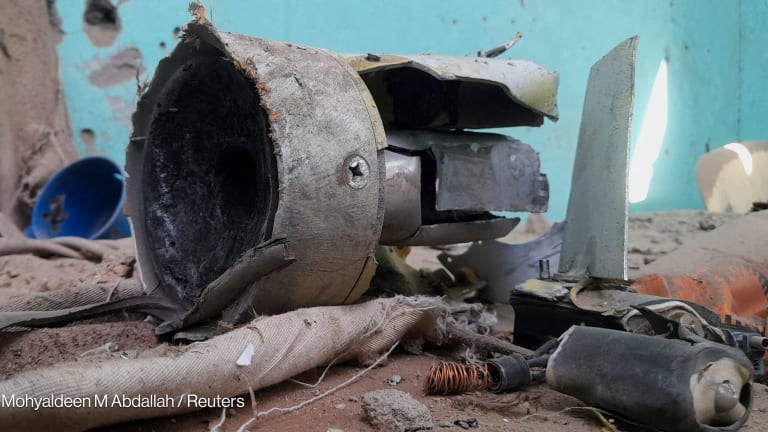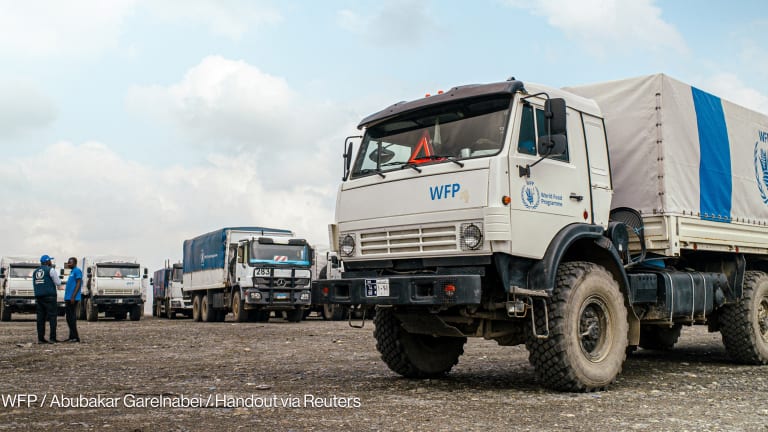US lawmakers push for more funding — and leadership — for Sudan
The United States is already the world's largest provider of humanitarian aid to Sudan. But 50 lawmakers have signed a letter calling for more.
Fifty U.S. lawmakers are urging the United States to do more for Sudan — a country torn at the seams by conflict, displacement, and hunger. “The war in Sudan is the largest humanitarian disaster in the world today,” the lawmakers wrote in a recent letter, addressed to U.S. Secretary of State Antony Blinken and USAID Administrator Samantha Power. “In the face of such incredible suffering, the U.S. must take extraordinary measures to support Sudanese civilians.” The U.S. is the largest humanitarian donor to Sudan, providing more than $1 billion to the country since its civil war began in April last year. For months, the U.S. has also tried to mediate talks between Sudan’s warring parties: the Sudanese Armed Forces, led by General Abdel Fattah al-Burhan, and the Rapid Support Forces, or RSF, a paramilitary group led by Mohamed Hamdan “Hemedti” Dagalo. And this year alone, the U.S. has contributed nearly half of the United Nations’ total humanitarian appeal for Sudan, according to data from the U.N. Office for the Coordination of Humanitarian Affairs. But despite those efforts, over 25 million people — half of Sudan’s population — are facing crisis levels of hunger. Both the SAF and RSF have been accused of mass atrocities, from civilians being deliberately shot dead, to girls as young as 12 being raped. U.S. officials estimate that up to 150,000 people have been killed since the war began, while another 10 million have been forced from their homes. In the Zamzam camp — the largest site for internally displaced people in the country — the situation is even worse. Since violence intensified in the camp’s vicinity earlier this year, Zamzam has been essentially sealed off by the RSF from humanitarian aid, explained Avril Benoît, the CEO of Médecins Sans Frontières in the U.S. As a result, famine was declared prevalent across the 500,000-person camp last month by the Integrated Food Security Phase Classification Famine Review Committee. “We get word saying this is opening, or this is working well, but that’s just not showing up on the ground,” Benoît told Devex. “And meanwhile, our data is showing this dramatic deterioration of the nutrition situation in Zamzam.” One in 10 children under the age of 5 are now suffering from severe acute malnutrition in the camp, according to a recent screening by MSF. Without treatment, most children suffering from severe acute malnutrition will die in a matter of weeks. “There’s been a lot of diplomatic effort, but it’s just not showing much in the way of results,” Benoît told Devex. “And so, the stalemate continues.” For months, the U.S. — led by Tom Perriello, the U.S. special envoy for Sudan — has tried to bring Sudan’s warring parties to the table. The last round of talks took place in Geneva, and while the RSF sent a delegation to Switzerland, the SAF declined to do the same. Still, the U.S. and its co-hosts, Saudi Arabia and Switzerland, pushed forward, along with observers including Egypt, the United Arab Emirates, the African Union, and the United Nations. The group — which calls itself the Aligned for Advancing Lifesaving and Peace in Sudan coalition, or ALPS — secured the opening of the Adré border crossing, which now connects eastern Chad to western Sudan. They also garnered agreements from both the RSF and SAF to allow safe passage along that route and one other, hoping to facilitate the movement of more aid to more people. As a result, Perriello stated that over 3,000 metric tons of supplies reached approximately 300,000 people in Darfur. Despite that, Benoît told Devex two MSF trucks are currently being held by the RSF, while another 40 World Food Programme trucks stocked with supplies are stuck at the Zamzam camp’s border. WFP told Devex that those trucks are delayed due to the rainy season, and that “there are damaged bridges, flooded roads, and very muddy road conditions that make it hard for trucks to pass at speed.” Though the spokesperson added the trucks are “on their way,” Benoît said her teams have seen “no sign” that humanitarian aid has entered Zamzam, and no sign that the blockade on the camp has been lifted. “We keep talking about road truck convoys without seeing road truck convoys,” Benoît said. “None of this, so far, seems to be working.” The State Department could not be reached for comment, but at a recent press conference, Perriello told reporters that the U.S. was engaging in diplomacy efforts around Sudan at “the highest levels,” noting the involvement of U.S. Secretary of State Antony Blinken. Still, Perriello told reporters he believed “the international community has failed to meet the level of urgency for the crisis in Sudan.” “We believe this recent initiative led by the United States was a significant statement about the fact that we can … no longer accept any excuses for inaction, and we want to move forward and produce the results we can, but we have a long [way to] go to do right by the people of Sudan,” said Perriello, according to a write-up of his remarks. At the same time, the U.N.’s humanitarian appeal for the country was just 49% funded as of early September, according to data from UNOCHA. Over the last two years, the U.S. has contributed more than $1.6 billion toward Sudan, while also sanctioning 16 “entities and individuals for contributing to the conflict, exacerbating instability, or serious human rights abuses,” according to a statement released by U.S. President Joe Biden last week. “Arms are still flowing into the country, which means people are still being killed, and that’s a problem,” U.S. Representative Sydney Kamlager-Dove, who led the lawmakers’ letter, told Devex. “Both the RSF and the SAF are compromising the delivery of aid, and that’s a problem. Not pushing for different delivery mechanisms to circumvent their bad behavior is also a problem. So I think there are a number of areas where the United States can and should be leading.” To do that, Kamlager-Dove and the other Congress members said Perriello’s office needs a “robust team backed by serious resources,” and that the U.S. should be pushing for “creative solutions” to combat the “numerous obstacles to aid delivery created by the SAF and the RSF.” “We urge you to ramp up support for cash programming and market-based assistance and direct greater funding to locally-led, grassroots response organizations like Emergency Response Rooms that are leading humanitarian efforts in many hard-to-access areas,” the letter states. Today, the U.S. Agency for International Development supports more than 30 U.N. and nongovernmental partners, agency officials said, and the majority of U.S.-funded humanitarian delivery is done by local organizations. In a recent event in Washington, D.C., USAID’s Deputy Administrator Isobel Coleman said the agency is providing approximately $31 million to more than 45 local partners in Sudan, working with those organizations on food security, health, nutrition, and other areas. “And yet we know these efforts are nowhere close to enough,” said Coleman, speaking at the event in early September. “The scale of the current humanitarian need far outpaces the resources USAID and even the entire international development community has at our disposal.” In their letter, the lawmakers asked the U.S. to leverage the upcoming U.N. General Assembly to “elevate the crisis to the highest levels of global action, including urging the UN Security Council to hold open briefings on Sudan until famine conditions are improved.” Many expect Sudan to come up repeatedly at the UNGA — the high-level debates of which begin this week. Linda Thomas-Greenfield, the U.S. ambassador to the U.N., has played a key role in the country’s response to the conflict, repeatedly calling for an end to the fighting, a surge of humanitarian aid, and renewed sanctions to restrict the movement of arms into Darfur. “Sunlight is the best disinfectant,” Kamlager-Dove told Devex. “If we’re not talking about it, that means no one else is talking about it. And that means the SAF and the RSF can continue to do what they’re doing.” Update, Sept. 24, 2024: This article has been updated to clarify that Benoît is the CEO at MSF USA and that UNGA high-level debates began this week.
Fifty U.S. lawmakers are urging the United States to do more for Sudan — a country torn at the seams by conflict, displacement, and hunger.
“The war in Sudan is the largest humanitarian disaster in the world today,” the lawmakers wrote in a recent letter, addressed to U.S. Secretary of State Antony Blinken and USAID Administrator Samantha Power. “In the face of such incredible suffering, the U.S. must take extraordinary measures to support Sudanese civilians.”
The U.S. is the largest humanitarian donor to Sudan, providing more than $1 billion to the country since its civil war began in April last year. For months, the U.S. has also tried to mediate talks between Sudan’s warring parties: the Sudanese Armed Forces, led by General Abdel Fattah al-Burhan, and the Rapid Support Forces, or RSF, a paramilitary group led by Mohamed Hamdan “Hemedti” Dagalo. And this year alone, the U.S. has contributed nearly half of the United Nations’ total humanitarian appeal for Sudan, according to data from the U.N. Office for the Coordination of Humanitarian Affairs.
This story is forDevex Promembers
Unlock this story now with a 15-day free trial of Devex Pro.
With a Devex Pro subscription you'll get access to deeper analysis and exclusive insights from our reporters and analysts.
Start my free trialRequest a group subscription Printing articles to share with others is a breach of our terms and conditions and copyright policy. Please use the sharing options on the left side of the article. Devex Pro members may share up to 10 articles per month using the Pro share tool ( ).
Elissa Miolene covers U.S. foreign assistance from Washington, D.C. She previously covered education at The San Jose Mercury News, and has written for The Wall Street Journal, the San Francisco Chronicle, and other news outlets across the world. Before shifting to journalism, Elissa led communications for aid agencies in the United States, East Africa, and South Asia.








